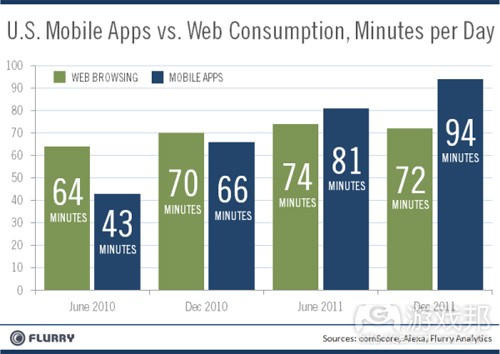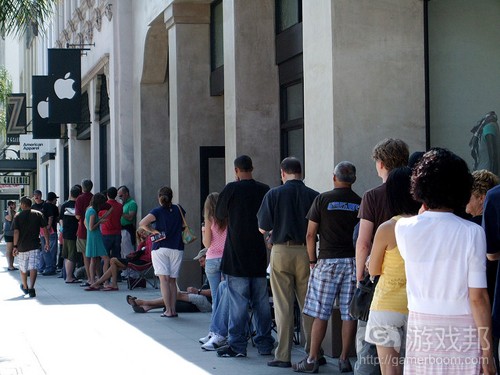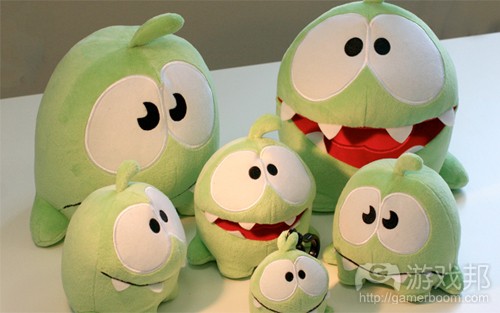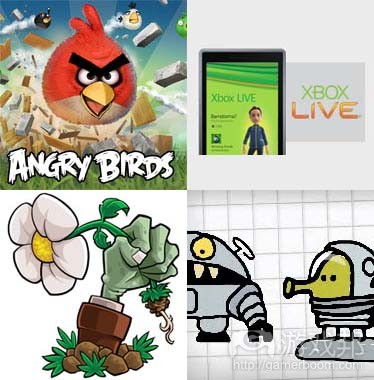每日观察:关注用户日均投入应用程序达94分钟(1.10)
1)移动分析公司最新数据显示,用户平均每天在应用程序上的投入时间为94分钟,而在台式电脑及移动设备上的网络浏览器使用率却呈现下降趋势(游戏邦注:Flurry数据取自其跟踪的14万款应用使用情况,以及comScore和Alexa调查的网络使用数据)。
比较Flurry在2011年6月份的数据,应用程序在12月份的每日使用率增加了13分钟,而网络浏览器每日使用率却从原来的74分钟降至72分钟。
用户对应用程序的主要用途是玩游戏和访问社交网络,其中游戏占比49%,社交应用占比30%,这两者合并占据将近80%的应用程序使用率。
Flurry预测Android和iOS设备激活量在2012年将超过10亿部,据IDC统计,1981至2000年的PC设备销量超过8亿部,可见iOS和Android设备的用户接受速度比PC快4倍以上。
2)Strategy Analytics最新报告预测,2012年手机及平板电脑应用程序将实现410亿次下载量;尽管苹果的智能手机市场份额仅为四分之一,但将在2013年占据半数以上的应用营收。
报告指出由于竞争加剧,以及智能手机在新兴市场中的崛起,各手机平台付费应用平均售价已开始下降,预计免费及虚拟商品模式在2012年市场规模将比2011年增长五倍,产值超过10亿美元。
3)手机游戏开发商NimbleBit最近通过Twitter宣布,iOS热门游戏《Tiny Tower》(在12月份被苹果评选为iPhone年度最佳游戏)每日独立玩家超过100万,玩家每天登录游戏超过1000万次,也就是每名玩家日均登录10次。
4)Yankee Group最近针对1.5万美国消费者的调查报告显示,苹果和谷歌智能手机市场行情最理想,苹果在用户中的支持率最高。
报告指出,四分之一的受访者已拥有一部iPhone,35%受访者有意在未来6个月中购买iPhone。
将近40%受访者已经拥有Android移动设备,也有同一比例的用户称打算在未来6个月中购买Android移动设备,也就是说,如果这些用户落实其购买计划,Android市场份额并不会输给苹果。
而其他智能手机平台所占市场份额目前不足20%,仅有12%受访者准备在未来6个月购买黑莓手机,其中有20%已经是黑莓用户;Windows Phone手机用户支持率也已从原来的14%下滑至9%。
Yankee Group预测用户的智能手机持有量仍将持续增长,尽管仅有47%的受访者已是智能手机用户,但仍有58%受访者计划购买智能手机。预计到2015年,美国智能手机用户将达1.75亿,超过2011年11月份的9140万。
5)三星近日宣布《愤怒的小鸟》将登陆三星Smart TV平台,后者开发商Rovio将向该平台提供《愤怒的小鸟》动画短片视频内容。
6)俄罗斯开发商ZeptoLab近日聘请Tanya Haider任公司授权及销售主管,以进一步扩大《割绳子》的周边商品授权业务。
Haider拥有海绵宝宝及Dora the Explorer儿童品牌授权工作经验,她将负责监管《割绳子》及小怪物Om Nom的品牌授权工作。
据ZeptoLab所称,《割绳子》自2010年10月发布以来在Android和iOS平台下载量已超过7000万次。
7)微软最近公布了2011年前20名Xbox Live热门游戏名单,居于榜首的是《愤怒的小鸟》,而《水果忍者》和《植物大战僵尸》则分别居于第二、第三席位。
入围前20名的其他游戏还包括《宝石迷阵》、《大富翁》、《俄罗斯方块》、《极品飞车:无间风云》以及Windows Phone平台独家游戏《外星收割者》、《神鬼预言:硬币高尔夫》和《触角神怪》。
在前20名榜单中,微软发行的产品占半数,其他入围游戏的发行商仅有EA及旗下公司PopCap、Gameloft、世嘉和GameHouse(发行《涂鸦跳跃》)上榜。
8)据pocketgamer报道,Disney Mobile最近宣布公司在2011年假期季iOS游戏下载量同比2010年增长40%,其中《Where’s My Water?》在12月25至31日的iOS和Android(付费和免费版本)下载量超过600万次。
该公司表示,这是Android产品在公司手机应用下载量中首次占据相当比重,公司目前向Android Market投放的三款游戏分别是《Where’s My Water?》、《Puffle Launch》和《Pirates of the Caribbean》,其他Android产品则是壁纸和图片编辑应用。(本文为游戏邦/gamerboom.com编译,拒绝任何不保留版权的转载,如需转载请联系:游戏邦)
1)Web consumption wanes as mobile app usage skyrockets
Jennifer Van Grove
The notion of the post-PC era may have legs to stand on, and Facebook could be playing a key role in the shift. This according to new data that highlights increasing mobile application usage at the expense of web consumption.
Mobile apps continues to rise in popularity, with people now spending 94 minutes per day, on average, using mobile applications, according to analytics firm Flurry. Meanwhile, web consumption, on both desktop and mobile devices, has started to wane.
Flurry tracked anonymous sessions across more than 140,000 applications and compared that data against web data from comScore and Alexa. Since the firm’s initial report in June, mobile app usage has increased by 13 minutes a day, while web consumption dipped from 74 minutes per day in June 2011 to 72 minutes per day in December 2011.
What are mobile app users doing? Gaming and Facebooking, of course. Games (49 percent) and social networking apps (30 percent) combined to account for almost 80 percent of all time spent in mobile applications, according to Flurry’s analysis.
The growing chasm between mobile app usage and web consumption will only be exacerbated by mobile device purchases in 2012. “Flurry estimates that the cumulative number of iOS and Android devices activated will surge past 1 billion,” Flurry senior marketing manager Charles Newark-French said. “According to IDC, over 800 million PCs were sold between 1981 and 2000, making the rate of iOS and Android smart device adoption more than four times faster than that of personal computers.”
Flurry anecdotally attributes the measurable shift to Facebook users who are increasingly accessing the social network via mobile applications. The firm does not track Facebook usage, but points to Nielsen data on Facebook mobile usage and the success of Facebook Messenger to support its hypothesis.
“As Apple and Google continue to battle for consumers through the operating system and devices, Facebook is demonstrating that it can leverage its hold over consumers at the software level, through the power of the social network, across multiple platforms,” Newark-French concludes.
So maybe it’s not evidence of a post-PC era per se, but instead a Facebook era that has consumers clamoring for access to their News Feeds wherever they are.
Here’s another interesting takeaway that may put to the rest the native vs. HTML5 app debate: The decrease in web consumption, which includes mobile web usage, could be evidence of consumers’ growing preference for rich, native application experiences.(source:venturebeat)
2)Apple will account for more than half of all app revenue by 2013
by Tim Green
Despite having around a quarter of the smartphone market.
A new report from Strategy Analytics says iOS will maintain its historic place as the most lucrative platform for apps.
It says competition will intensify in the space, with an expected 41 billion phone and tablet downloads in 2012.
But Apple will not be dislodged from the top spot, even though iOS devices account for between 20 and 30 per cent of the smartphone market depending on which source you go to.
Strategy Analytics believes the average selling price of paid downloads is declining across every major platform, as competition heats up and devices move into emerging markets.
This explains the rise in freemium and virtual goods – an industry which will quintuple in size from 2011 to more than $1 billion in 2012.
Josh Martin, director of apps research at Strategy Analytics. “Unlike paid downloads that offer one time payment, virtual goods allow developers to earn recurring revenue from heavily used apps making the business opportunity appealing. Despite the importance of virtual goods, few platforms beyond the leaders have stepped up.(source:mobile-ent)
3)1M active Tiny Tower users play an average of 10 times a day
by Tom Curtis
Newsbrief: Mobile developer NimbleBit announced that its iOS hit Tiny Tower now sees more than one million unique players per day, marking a new milestone for the free-to-play building management title.
The game has seen some impressive success since its launch in June 2011, and NimbleBit’s Ian Marsh said on Twitter that the game currently sees more than 10 million play sessions per day.
Last month, Apple named Tiny Tower its iPhone Game of The Year on the iTunes App Store, offering the game a highlighted spot on the marketplace to help it pull in more users during the busy holiday season.(source:gamasutra)
4)Study: iOS set to win share as smartphones surge
By Darrell Etherington
Apple is set to reap the benefits of increased consumer interest in smartphones, according to a new study by market research firm Yankee Group. A survey of 15,000 U.S. shoppers found that Apple and Google will dominate, with Apple’s winning back share of the smartphone market over the next six months.
It is a trend that already appears to be in motion: Ryan Kim wrote about how, according to the latest NPD numbers, Apple’s iOS mobile platform made big strides in closing the gap between itself and Android in recent months. The Yankee Group survey anticipates that this will continue: While a quarter of those it surveyed already own an iPhone, 35 percent said they planned on getting one within six months’ time. The Yankee Group’s study echoes results from ChangeWave that we wrote about earlier, but it covers a wider user base, time period and focus on platforms instead of individual handset makers.
Android is and will remain strong in terms of consumer interest, according to the survey, but it won’t put any more distance between it and Apple. Nearly 40 percent of respondents indicated that they already own an Android device, but just the same amount said they planned on getting one within the next six months; in other words, Android won’t drop share to Apple if people stay true to their buying plans, but it won’t expand its current reach in the U.S.
The real losers, however, are the smartphone platforms that account for less than 20 percent of today’s market share, since, according to the survey, their percentage will only continue to slide. Yankee Group predicts that only 12 percent of respondents intend to buy a BlackBerry in the next six months, despite that 20 percent of those surveyed already own one. Interest in Windows Phone devices similarly drops from a current high of 14 percent to only 9 percent’s intending to purchase one within six months’ time. Of course, this is based on consumer perception of the field as it stands: New devices, changes to software and pricing could always alter buying plans.
Overall, Yankee Group predicts that smartphone ownership should increase, since only 47 percent of those polled currently own one but 58 percent indicated intent to purchase one within the next six months. Yankee Group expects the smartphone market to surge to 175 million devices in the U.S. by 2015, up from 91.4 million as of Nov. 2011.(source:gigaom)
5)Angry Birds game and TV show are coming to Samsung’s Smart TVs
Dean Takahashi
Samsung announced today that the Angry Birds franchise will come to the company’s Smart TVs in the near future. In addition, Rovio, the maker of the Angry Birds games, will provide animated Angry Birds shorts to Samsung’s Angry Birds channel for the Smart TVs.
The deal extends Angry Birds, which became a cultural phenomenon as the most downloaded mobile game in history with hundreds of millions of downloads, from the mobile realm to the emerging platform for apps on TVs. Samsung is one of many TV companies creating Internet-connected TVs that are capable of running apps, or programs developed to run on TV screens.
Smart TVs are just in their infancy, and apps may be the way to make them more popular. With the animation channel, Rovio is taking the game brand and extending it to animated shows and movies as well. Samsung made the announcement at the Consumer Electronics Show in Las Vegas. When Samsung officials showed an animated short of an Angry Bird character, it drew chuckles from the crowd of thousands of journalists.(source:venturebeat)
6)Cut the Rope studio staffs up for merchandising push
by Frank Cifaldi
Newsbrief: ZeptoLab, developer of the popular mobile game Cut the Rope, will expand its marketing push with the hire of a new head of licensing and merchandising.
Tanya Haider joins the San Francisco company after a career specializing in kids brands that include SpongeBob Squarepants and Dora the Explorer. At ZeptoLab, she will oversee a new initiative to license and merchandise the studio’s brands, including Cut the Rope and its monster mascot, Om Nom.
Haider will oversee two appointed representatives, Bob Traub of Established Brands Licensing and Robert Miller of Studio Licensing, to represent the brand in North America and Canada, respectively.
Cut the Rope has seen over 70 million downloads across its Android and iOS iterations since launching in October 2010, according to ZeptoLab.(source:gamasutra)
7)Angry Birds heads the list of 2011′s top 20 most popular Xbox Live games on Windows Phone
by Keith Andrew
Though it’s a feat that’s becoming harder to achieve, one of the appeals of digital marketplaces like the App Store used to be the ability for start ups to come out of nowhere and score a smash.
On Windows Phone, however, studios have frequently complained that, without Xbox Live support, games go unnoticed on the platform’s marketplace.
It’s a frustrating facet of life on the OS, if only because Microsoft appears especially picky about which games can and cannot tap into the service.
Angry indies
Evidence of this is displayed in the list of the top 20 most popular Xbox Live titles during 2011, based on their unique users, as revealed by Microsoft’s director of programming Lawrence Hryb (better known as Major Nelson).
Coming out on top – predictably – is Rovio’s Angry Birds, with Halfbrick’s Fruit Ninja and PopCap’s Plants vs. Zombies taking the second and third spots on the countdown.
Other top twenty titles include PopCap’s other major franchise Bejeweled, EA licenses such as Monopoly, Tetris and Need for Speed: Undercover, and Windows Phone exclusives like The Harvest, Fable: Coin Golf and Tentacles.
Indeed, of the 20 games on offer, Microsoft is the publisher of half of them, with only EA, its newly owned subsidiary PopCap, Gameloft, Sega and GameHouse (thanks to its licensing of Doodle Jump) breaking its stranglehold on the platform.(source:pocketgamer)
8)Disney praises Android. Says holiday season saw it become a viable mobile gaming platform
by Jon Jordan
Apparently, the holiday season was a time of giving, family and downloading apps – as Flurry has told us.
And Disney Mobile was pretty popular too, as it’s happy to tell us, with iOS downloads up 40 percent compared to 2010 over the period.
And its big hit of 2011, Where’s My Water? received more than 6 million times on iOS and Android (free and paid versions), between 25-31 December.
Loving the robot
More significant, however, Disney is particularly bigging up the power of Android.
“This was the first holiday season for Android as a viable mobile gaming platform, for the first time making up a significant portion of Disney Mobile’s overall downloads,” the company states.
To-date, Disney has three games available on Android Market, Where’s My Water?, Puffle Launch and Pirates of the Caribbean, plus wallpaper and photo editing apps. (source:pocketgamer)














































 闽公网安备35020302001549号
闽公网安备35020302001549号